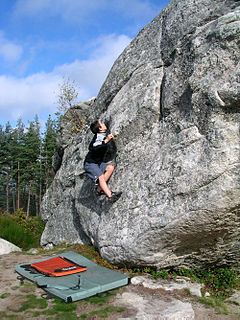 W
WA bouldering mat or crash pad is a foam pad used for protection when bouldering. Bouldering mats help prevent climbers from becoming injured when falling from short heights.
 W
WA bungee cord is an elastic cord composed of one or more elastic strands forming a core, usually covered in a woven cotton or polypropylene sheath. The sheath does not materially extend elastically, but it is braided with its strands spiralling around the core so that a longitudinal pull causes it to squeeze the core, transmitting the core's elastic compression to the longitudinal extension of the sheath and cord. Specialized bungees, such as some used in bungee jumping, may be made entirely of elastic strands.
 W
WA cage ball, also known as an Earth ball, is a large, inflated ball, used in many American elementary schools physical education programs. Cage balls typically have a diameter of 48" or 60", though 72" diameter models are available. The inventor of the cage ball is Doctor Emmett Dunn Angell.
 W
WChampionChip is a brand name of one type of passive RFID transponders, marked with a unique identification number and used in active sports events to keep track of the competition times of participants. It is one manufacturer's implementation of transponder timing.
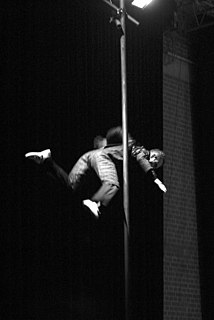 W
WChinese poles are vertical poles on which circus performers climb, slide down and hold poses. The poles are generally between 3 and 9 metres in height and approximately 2 to 3 inches in diameter. Some poles have a slightly larger pole that rotates around the static central pole using ball bearings. This rotating pole allows a performer to spin on the vertical axis, giving a performer the ability to incorporate rate of spin into a performance. Bringing the body closer into the pole causes the performer to spin faster. A few Chinese pole tricks have been incorporated with pole dancing techniques.
 W
WA dip bar is a piece of fitness equipment that consists of a U-shaped bar, usually about 1" in diameter, which surrounds the user's body at the waist. It is designed for the performance of, and named after, the dip exercise.
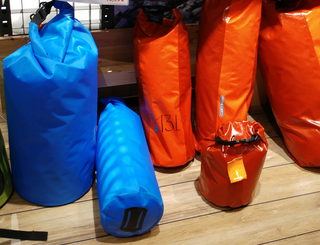 W
WA dry bag is a type of flexible container which seals in a watertight manner. Dry bags are often used in kayaking, canoeing, rafting, canyoning, and other outdoor activities where sensitive items would otherwise get wet as well as extreme sports such as skiing and snowboarding. Dry bags are used to protect electronics from water. As well, they are used to prevent sleeping bags and spare clothing from getting wet, as in a camping context, wet sleeping bags or spare clothing could post a risk to a camper's safety, due to the poor insulative qualities of wet clothing or sleeping bags.
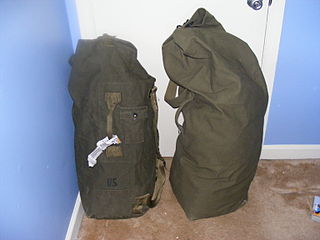 W
WA duffel bag, duffle bag, or kit bag is a large bag made of natural or synthetic fabric, historically with a top closure using a drawstring. Generally a duffel bag is used by non-commissioned personnel in the military, and for travel, sports and recreation by civilians. When used by sailors or marines a duffel is known as a seabag. A duffel's open structure and lack of rigidity makes it adaptable to carrying sports gear and similar bulky objects.
 W
WThe Flex-Foot Cheetah is a prosthetic human foot replacement developed by biomedical engineer Van Phillips, who had lost a leg below the knee at age 21; the deficiencies of existing prostheses led him to invent this new prosthesis.
 W
WA foilboard or hydrofoil board is a surfboard with a hydrofoil that extends below the board into the water. This design causes the board to leave the surface of the water at various speeds.
 W
WA grind rail is an object used by skateboarders to do skateboarding tricks on such as grinds and slides. It is usually square or round.
 W
WHockey socks are ankle-to-thigh garments worn over protective gear by ice hockey players. They are form-fitting, and traditionally made of a cotton or synthetic rib-knit fabric. Experiments have been made with a lightweight fabric "sock," of material similar to that used in hockey jerseys, and most recently (mid-2000s) with a streamlined lightweight "sock" used by the U.S. Olympic and other international teams. Hockey socks should not be confused with hockey skate socks which are thin, traditional style socks worn over the foot.
 W
WA hydration pack is a type of hydration system built as a backpack or waistpack containing a reservoir or "bladder" commonly made of rubber or flexible plastic. The reservoir contains a capped mouth for filling with liquid and a hose that allows the wearer to drink hands-free. Most hoses end with a "bite valve" that opens when the user bites down on it; the valve may be protected by a dust cover. Some hydration packs are insulated to keep water from freezing or becoming warm.
 W
WHysplex is a starting gate used in ancient Greek horse and foot races. This device was set up at the starting line and consisted of an upright vertical bar that held a horizontal gate attached to it held up by a string. Each racer stood behind his own hysplex and all of the strings were centrally connected behind the runners, held by a referee. At the start of the race, the referee let go of all the strings; and consequently the starting gates fell at the same time, releasing the runners.
 W
WLacrosse gloves are heavily padded, protective gloves worn by men's lacrosse players. The gloves are designed to protect players' hands, wrists, and forearms from checks, or legal defensive hitting common in the sport. Gloves consist of thick padding on the back of the hand and forearm covered in leather or canvas material, and a palm area made of synthetic and mesh material. A goaltender's gloves may have extra padding for the thumb to protect against injury from shots. While NCAA collegiate rules require that men's gloves have palms covered, other leagues, including post-collegiate club lacrosse, the National Lacrosse League, Major League Lacrosse, and international play, permit players to cut out the palm area for greater grip and control of the lacrosse stick.
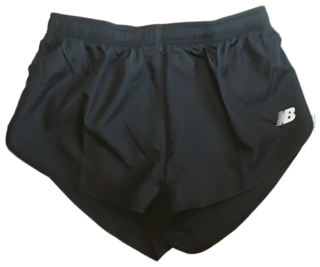 W
WRunning shorts are a specialized form of shorts worn by runners.
 W
WA scrimmage vest, sometimes referred to as a pinny, is a piece of clothing or sportswear, often made of mesh, used in practices as a substitute for a sports team's usual uniform or to differentiate temporary teams in informal scrimmages. Some teams elect to have benched players wear them during a game. A vest can come in a variety of forms, including a racerback cut, collegiate cut, basketball cut or lacrosse pinny.
 W
WShoulder pads are a piece of protective equipment used in many contact sports such as gridiron football, lacrosse and hockey. Most modern shoulder pads consist of a shock absorbing foam material with a hard plastic outer covering. The pieces are usually secured by rivets or strings that the user can tie to adjust the size.
 W
WA splitboard is a snowboard that can be separated into two ski-like parts used with climbing skins to ascend slopes the same way alpine touring or telemark skis are. Similar to cross country skiing, splitboarding allows free heel movement and with skins attached to the bottom of the skis, provides uphill traction. The two halves can then be connected to form a regular snowboard for descent. Splitboarding culture often focuses on the idea of using your own power to access the backcountry usually on unmaintained trails.
 W
WSurf Diva is a surf company from La Jolla, California, United States. They serve surf clinics at La Jolla Shores and provide clothes and equipment for surfing.
 W
WA tarp tent is a tarpaulin, a plastic or nylon sheet, used in place of a tent. It is usually rigged with poles, tent pegs, and guy lines. Ultralight backpackers use tarp tents because they are lightweight compared to other backpacking shelters.
 W
WA thumb compass is a type of compass commonly used in orienteering, a sport in which map reading and terrain association are paramount. In cases of homogeneous terrain with few distinct features, a bearing between 2 known points on the map may be used. Consequently, most thumb compasses have minimal or no degree markings at all, and are normally used only to take bearings directly from a map, and to orient a map to magnetic north. Thumb compasses are also often transparent so that an orienteer can hold a map in the hand with the compass and see the map through the compass.
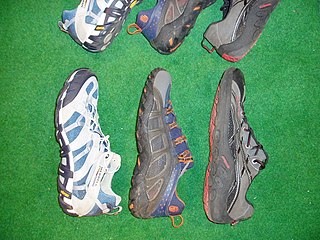 W
WA water shoe is a type of footwear that is typically used for activities where the feet are likely to become wet, such as kayaking. Water shoes are usually made of mesh and have a hard sole used to prevent cuts and abrasions when walking in wet, rocky environments. They may often have tiny holes on the bottom or sides of the sole to allow for quick water drainage, which keeps helps wearer's feet dry faster, keeps the shoes light, and prolongs the lifespan of the material. Additionally, most people do not wear socks with water shoes.
 W
WWrestling headgear is protection that a person wears over the ears and chin during wrestling matches.
 W
WWrestling shoes are active wear used in competition and practice for the sport of wrestling. Generally light and flexible, they try to mimic the bare foot, while providing slightly more traction and ankle support and less chance of contracting a disease or hurting the opponent with exposed toe nails. As a result, wrestling shoes tend to have a high top design to provide ankle support and cushioning.